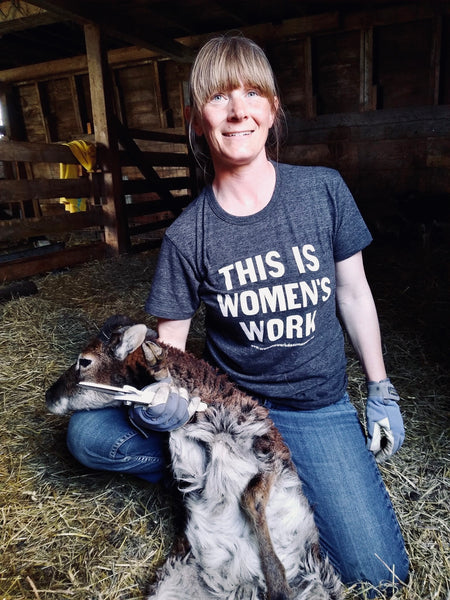
Theresa Bentz wearing our This Is Women's Work Tee
____
Tell us about your farm!
We raise a small flock of Icelandic sheep on 40 acres of restored prairie and wooded areas. Our sheep help maintain the land and we market their wool and lamb meat at local farmers markets. We process all of our woolen supplies locally, and only use small family-owned mills that support local communities. We are passionate about the role small ruminants play in land management and soil health, and about the importance of local sustainable fiber products. We consider ourselves homesteaders and are very self-sufficient, we cut our own hay using old farm equipment, we can our food, tan hides, and tap our maples. We are also like many first-generation farmers and have day jobs that help support our dream.
We raise a small flock of Icelandic sheep on 40 acres of restored prairie and wooded areas. Our sheep help maintain the land and we market their wool and lamb meat at local farmers markets. We process all of our woolen supplies locally, and only use small family-owned mills that support local communities. We are passionate about the role small ruminants play in land management and soil health, and about the importance of local sustainable fiber products. We consider ourselves homesteaders and are very self-sufficient, we cut our own hay using old farm equipment, we can our food, tan hides, and tap our maples. We are also like many first-generation farmers and have day jobs that help support our dream.
____
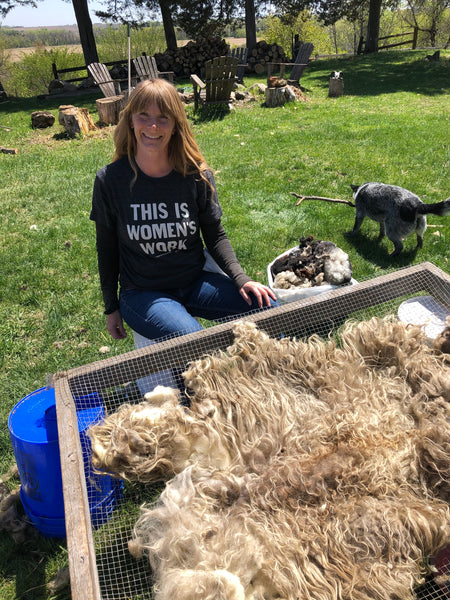
____
How did you get into farming?
As we got older and started learning more about where our food comes from and the issues with truth in labeling in this county, we decided to start taking the steps towards farming and having control of our food systems. We started with raising chickens and turkeys at a cousin's farm, meeting local farmers and became members of a CSA. After doing this for a few years we decided it was time to branch out and do it ourselves. We started looking for land in early 2012 and landed on our current farm in the winter of 2014. Since moving to the farm we have learned what works for us and what doesn’t. We decided to raise heritage sheep to help restore the woods and establish prairie in the areas that were once commercially cropped.
As we got older and started learning more about where our food comes from and the issues with truth in labeling in this county, we decided to start taking the steps towards farming and having control of our food systems. We started with raising chickens and turkeys at a cousin's farm, meeting local farmers and became members of a CSA. After doing this for a few years we decided it was time to branch out and do it ourselves. We started looking for land in early 2012 and landed on our current farm in the winter of 2014. Since moving to the farm we have learned what works for us and what doesn’t. We decided to raise heritage sheep to help restore the woods and establish prairie in the areas that were once commercially cropped.
____
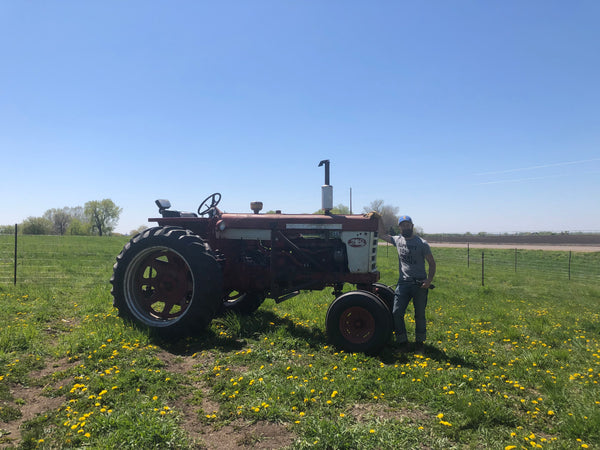
____
What are some of the biggest challenges you face as a farmer?
Weather! Ugh! Cutting hay in wet conditions is heartbreaking. We need hay to feed our animals in the winter, so wet springs and falls are just killer! We have also found that the climate changes affect our animals and their health. Our winters have become very cold and windy, which adds stress to the sheep during their pregnancy. The spring weather can change from hot and sunny, to cold and blizzard conditions in one day, which makes lambing and shearing difficult. The last few summers have been wet and very hot, which has increased parasites in the soil and have gotten the sheep sick. The falls have been very similar to the springs, hot one day and a blizzard the next. Climate change has kept us on our toes and made us change practices we used the previous season because it may not work anymore.
Weather! Ugh! Cutting hay in wet conditions is heartbreaking. We need hay to feed our animals in the winter, so wet springs and falls are just killer! We have also found that the climate changes affect our animals and their health. Our winters have become very cold and windy, which adds stress to the sheep during their pregnancy. The spring weather can change from hot and sunny, to cold and blizzard conditions in one day, which makes lambing and shearing difficult. The last few summers have been wet and very hot, which has increased parasites in the soil and have gotten the sheep sick. The falls have been very similar to the springs, hot one day and a blizzard the next. Climate change has kept us on our toes and made us change practices we used the previous season because it may not work anymore.
____
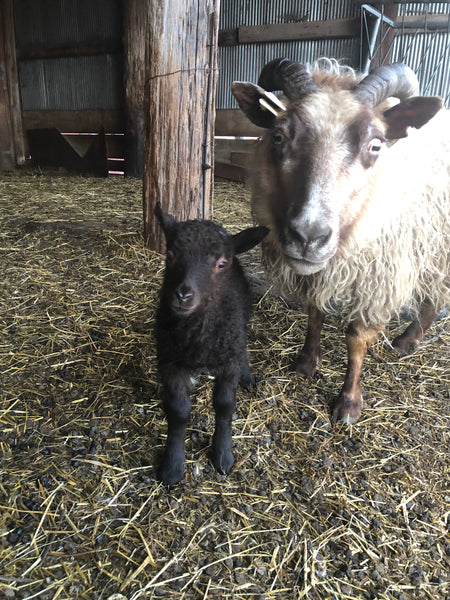
____
What are your thoughts and beliefs on farming in the face of climate change?
We, as farmers and ranchers, have to learn to adapt to climate changes and communities have to support us so we can adapt. Sustainable farming and ranching has the opportunity to slow down and help reduce the future effects of climate change, and as a small sustainable rancher I have seen the soil, water, and air become cleaner from my grazing management practices.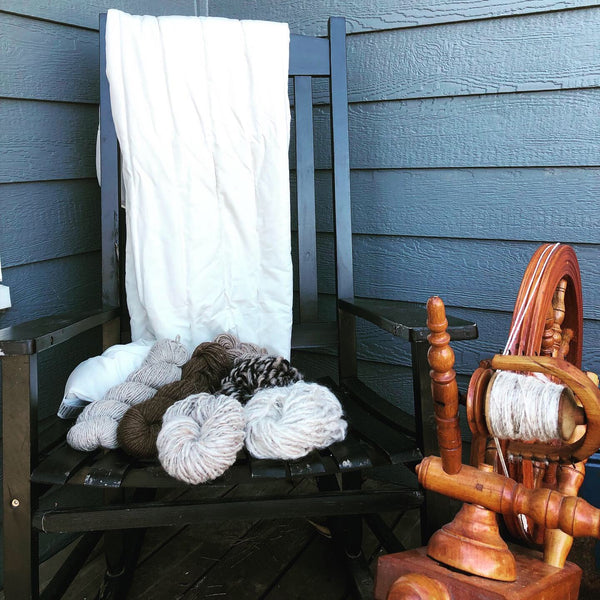
I hope people take this time, in this uncertain world and time, to really know where their food comes from and to establish a relationship with their farmers and ranchers. I hope we start to learn about the role of textiles in global pollution, climate change, and waste and I hope we all dedicate ourselves to waste less, to stop buying into fast fashion, to support natural fibers and natural dyes.
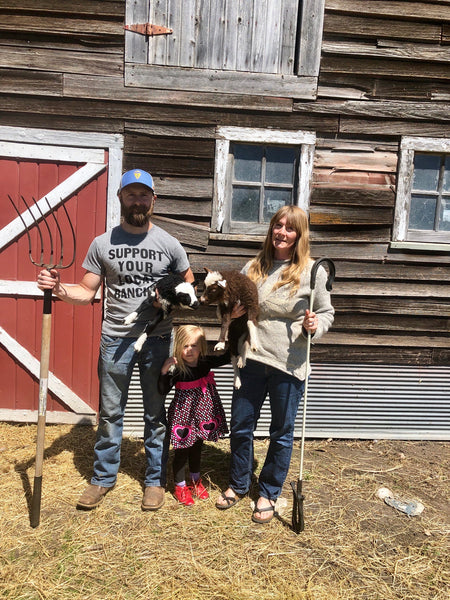
We, as farmers and ranchers, have to learn to adapt to climate changes and communities have to support us so we can adapt. Sustainable farming and ranching has the opportunity to slow down and help reduce the future effects of climate change, and as a small sustainable rancher I have seen the soil, water, and air become cleaner from my grazing management practices.
Sustainable farming is not easy, it is very intentional and specific, and the profit margins are tight, it costs more to the farmer to use these practices. We, as a larger community of farmers/ranchers and customers, need to start supporting our local food and fibersheds by purchasing directly from the farmer/rancher and wasting less.
In this county, we have become accustomed to purchasing new clothing each season. Fast fashion is a huge contributor to global warming and waste in the landfills. Fast fashion offers us cheap clothing that is designed to wear out after a few washings, we may donate this clothing but the majority of clothing donated to thrift stores ends up in the landfill. As a shepherd and wool producer, I can create a garment or bedding item that will literally last you the rest of your life, and the lives of your children! Can you imagine what a difference that would make to our global waste? Imagine if everyone had one pillow or comforter that lasted their entire life, and the life of their children, instead of purchasing a new item every few years.
We must remember as consumers that our dollar is very powerful, we can use it to support farmers who are using sustainable practices, we can use it to support local fibersheds and purchase garments that last, or we can continue to contribute to fast fashion and global waste.
We must remember as consumers that our dollar is very powerful, we can use it to support farmers who are using sustainable practices, we can use it to support local fibersheds and purchase garments that last, or we can continue to contribute to fast fashion and global waste.
____

____
What are some misconceptions you hear about farming and agriculture when it comes to climate change that you'd like to address?
As a rancher or livestock grower I hear it all. I would like people to understand how important it is to build a relationship with their local farmers and ranchers, so that they understand the agricultural practices the farm is practicing. Often people believe sensationalized information that provides inaccurate information regarding the effects agriculture has on climate change. This information, when shared, can spread like wildfire and misinform more people. I don’t believe it is anyone's intention to spread inaccurate information, but often we are emotionally captured by misinformation, and we share it without taking the time to really investigate where the information came from. I hope people start to understand the role sustainable agriculture has in restoring and healing the earth, and that they are willing to support this type of agriculture financially, through their purchases and relationships with the farmer.
As a rancher or livestock grower I hear it all. I would like people to understand how important it is to build a relationship with their local farmers and ranchers, so that they understand the agricultural practices the farm is practicing. Often people believe sensationalized information that provides inaccurate information regarding the effects agriculture has on climate change. This information, when shared, can spread like wildfire and misinform more people. I don’t believe it is anyone's intention to spread inaccurate information, but often we are emotionally captured by misinformation, and we share it without taking the time to really investigate where the information came from. I hope people start to understand the role sustainable agriculture has in restoring and healing the earth, and that they are willing to support this type of agriculture financially, through their purchases and relationships with the farmer.
I hope people take this time, in this uncertain world and time, to really know where their food comes from and to establish a relationship with their farmers and ranchers. I hope we start to learn about the role of textiles in global pollution, climate change, and waste and I hope we all dedicate ourselves to waste less, to stop buying into fast fashion, to support natural fibers and natural dyes.
____

____
What future are you farming for and how do you think your farm can make a difference?
I hope that we can build relationships and break down misconceptions about what it means to be a livestock farmer. I also want people to understand how important it is to support natural fibers and fibersheds, meaning to purchase locally produced and milled fiber. Wool lasts a lifetime, wool is so amazing, we should wear wool, sleep in wool, insulate our homes in wool, instead of using plastic products that are covered in harmful chemicals. We should waste less, save and rewear, own less, and mend to extend the life of our items.
I hope in the future more people understand the importance of supporting local foodsheds and fibersheds, that we see our habits as part of the large problem, and that we make real changes with how we spend our money. Our planet needs us to make these changes.
I hope that we can build relationships and break down misconceptions about what it means to be a livestock farmer. I also want people to understand how important it is to support natural fibers and fibersheds, meaning to purchase locally produced and milled fiber. Wool lasts a lifetime, wool is so amazing, we should wear wool, sleep in wool, insulate our homes in wool, instead of using plastic products that are covered in harmful chemicals. We should waste less, save and rewear, own less, and mend to extend the life of our items.
I hope in the future more people understand the importance of supporting local foodsheds and fibersheds, that we see our habits as part of the large problem, and that we make real changes with how we spend our money. Our planet needs us to make these changes.
____
Where can we follow along and support you?
Website: www.getbentzfarm.com
Instagram: @getbentzfarm

